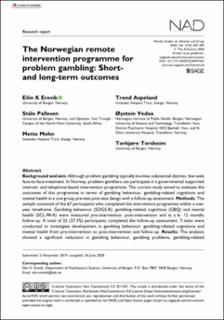The Norwegian remote intervention program for problem gambling: Short- and long-term outcomes
Peer reviewed, Journal article
Published version
Permanent lenke
https://hdl.handle.net/11250/2727712Utgivelsesdato
2020Metadata
Vis full innførselSamlinger
- Institutt for psykisk helse [1308]
- Publikasjoner fra CRIStin - NTNU [38525]
- St. Olavs hospital [2574]
Originalversjon
Nordic Studies on Alcohol and Drugs. 2020, 37 (4), 365-383. 10.1177/1455072520947247Sammendrag
Abstract Background and aim: Although problem gambling typically involves substantial distress, few seek face-to-face treatment. In Norway, problem gamblers can participate in a governmental supported internet- and telephone-based intervention programme. The current study aimed to evaluate the outcomes of this programme in terms of gambling behaviour, gambling-related cognitions and mental health in a one group pre-test post-test design with a follow-up assessment. Methods: The sample consisted of the 67 participants who completed the intervention programme within a one-year timeframe. Gambling behaviour (SOGS-R), gambling-related cognitions (GBQ) and mental health (SCL-90-R) were measured pre-intervention, post-intervention and at a 6−12 months follow-up. A total of 25 (37.3%) participants completed the follow-up assessment. T-tests were conducted to investigate development in gambling behaviour, gambling-related cognitions and mental health from pre-intervention to post-intervention and follow-up. Results: The analyses showed a significant reduction in gambling behaviour, gambling problems, gambling-related cognitive distortions and mental health symptoms from pre-intervention to post-intervention and follow-up. The corresponding effect sizes for the reductions in gambling and gambling-related cognitive distortions were very large, while the effect sizes for the reductions in mental distress were moderate. Conclusion: The internet/telephone programme appears to have several positive outcomes including reduction in gambling behaviour, gambling problems, gambling-related cognitive distortions and symptoms of mental disorders both in the short and long term. Another positive outcome of participation appears to be a lowered threshold for seeking additional treatment. The current study entails, however, important limitations, and future studies should investigate the outcomes of the programme while including a control group. Keywords cognitive behavioural therapy, gambling, mental health, problem gambling, remote therapy, telemental health applications

